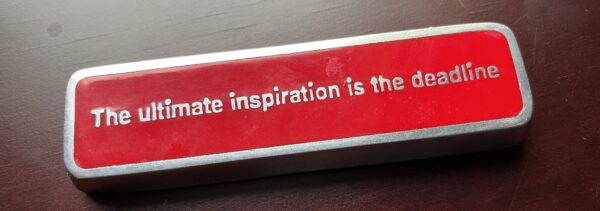
By Joel Dresang
I have given notice. I told my boss when I intend to retire. I cited a month and a year. My notice is well in advance of my departure to help the firm plan a transition to doing without me.
At the same time, I hope that setting a date will help me focus on working my way toward retirement.
Establishing a retirement deadline and sharing it with others (I discussed it with my wife first.) is akin to making a new year’s resolution. For me, though, retirement is a sober commitment years in the making with many years of payoff. Or so I hope.
When you retire can affect other financial decisions, including:
Choosing Your Retirement Date: Here’s What You Should Know
• When you claim Social Security benefits
• When and how much of your retirement savings you withdraw
• The order in which you withdraw from various accounts
• How you pay for health care if you retire before Medicare eligibility
• How much you work part-time or start a business for extra income
Thinking about the time and effort it took me to get to this point in my working life, it’s fitting to be deliberate about winding down. After decades of school and internships and on-the-job training at multiple employers, it doesn’t seem appropriate to just one day abruptly leap from a treadmill to an easy chair.
I know enough from years of discussions with my wife and our investment advisors to feel comfortable with the financial implications of retirement. Not that I’ve got it all figured out, but I have an idea of what needs to be done. I also have the security of knowing that our advisor has our back.
A couple of years ago, I told our advisor that the timing of my retirement might well be prompted by something I can’t control or foresee. That still could be the case, but I have been feeling shifts in me that suggest it’s getting time to start pursuing what’s next. For instance, I’ve felt stupid lately when someone asks when I’m going to retire, and I just shake my head and shrug.
A year ago, Glenn Ruffenach, a retirement columnist at The Wall Street Journal, wrote his farewell column. At 70, after 40 years in journalism, Ruffenach shared insights on knowing when it’s time to call it quits.
“(F)or many, the answer is simple,” Ruffenach wrote. “You retire when work has become a bore or a bother. Or when your nest egg, finally, is the right size. Or when grandchildren and travel beckon. Or when, in the words of the late Joseph Campbell, you find ‘your bliss.’ Or when your body tells you it’s time.”
I acknowledge that I’d be fortunate to leave work on more or less my own terms. I’m far too familiar with folks who lost their jobs or their health or their partner before they took the chance to plan their exit.
New Year’s resolutions are scoffed at for being hastily made and quickly abandoned. But they’re a form of goal-setting, which helps motivate us to take action, according to Theo Tsaousides, a neuropsychologist writing in Psychology Today.
“Being actively engaged in the pursuit of a goal activates the brain’s pleasure centers, independent of the outcome,” Tsaousides explains. “It seems that we derive more pleasure from chasing our dreams than from achieving them.”
Indeed, I have felt lighter after declaring my deadline. Actually, it’s more of a goal line. I like seeing how close I’m getting.
Besides, having worked 30 years in journalism, I’m OK with deadlines. They can add a sense of urgency, focus and accountability to plans. They provide specificity and commitment to otherwise vague resolutions - the difference between just saying you’re going to get in better shape and registering for a 5-kilometer run before your next birthday.
Because it’s still far away, I am only selectively sharing the specifics of my intentions. If someone asks me directly, as the partner of a long-time friend did at a funeral recently, I’ll admit broadly to having a plan. Buy-in from others holds me more accountable than keeping to myself – or worse, not having a plan.
Having a plan and setting a date are most crucial for our finances. We need to know how we’ll get by without my paychecks. How much will we have to adjust our spending? Will we need part-time jobs? How much can we count on from Social Security and pensions? How much will we need from our investments? How long can those funds last? What tax consequences should we expect?
The deadline I have set establishes a reasonably long runway for both landing my working life and launching my retirement. There’s still uncertainty ahead, but it helps to see the goal post.
“Think about retirement as a privilege. One that we shouldn’t waste,” Ruffenach wrote. “(A)nd if you recognize, to be blunt, that the time to seize that privilege is relatively brief—a decision about if and/or when to retire might come more easily.”
Joel Dresang is vice president-communications at Landaas & Company.
For What It’s Worth: Deadline
(initially posted Jan. 5, 2024)